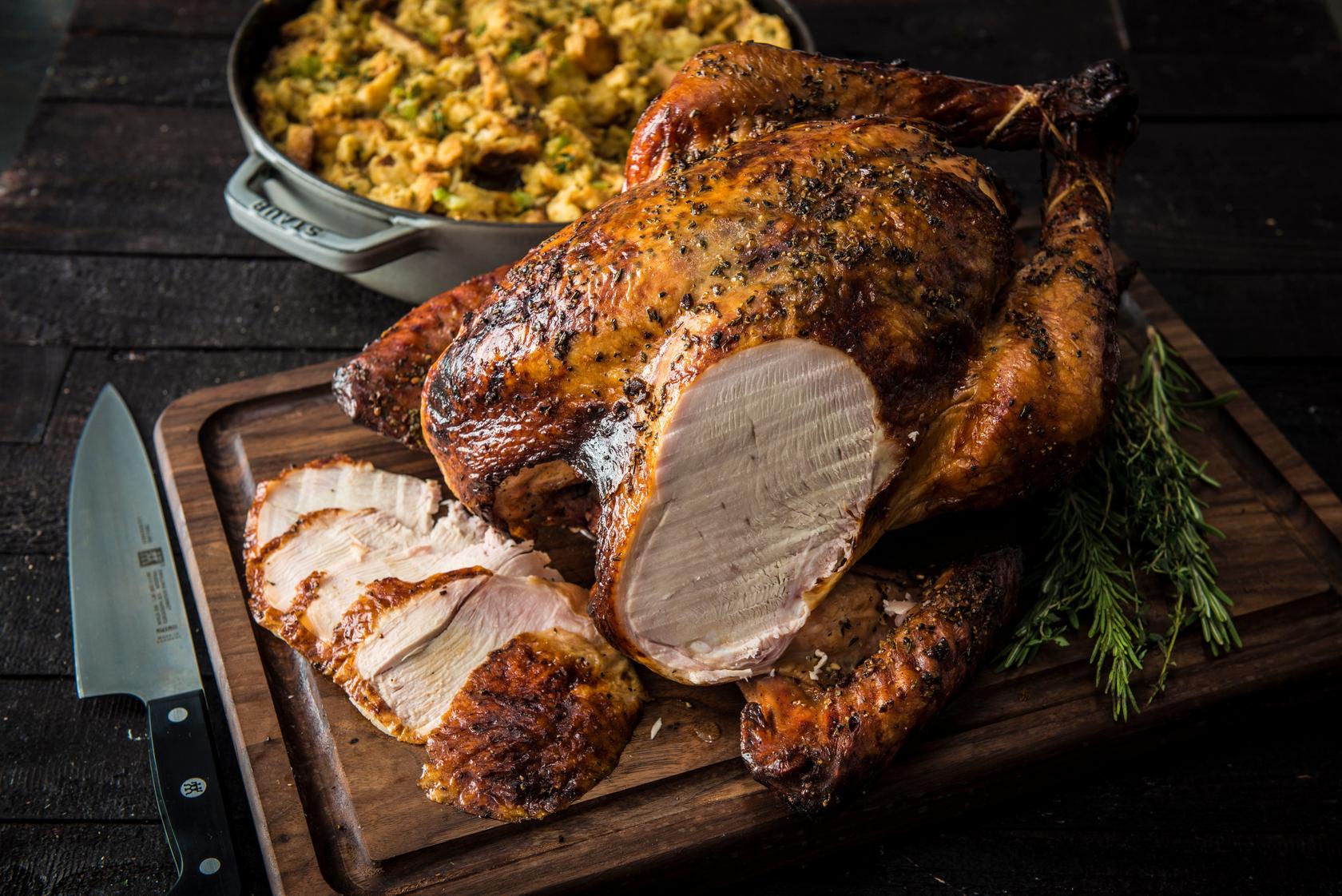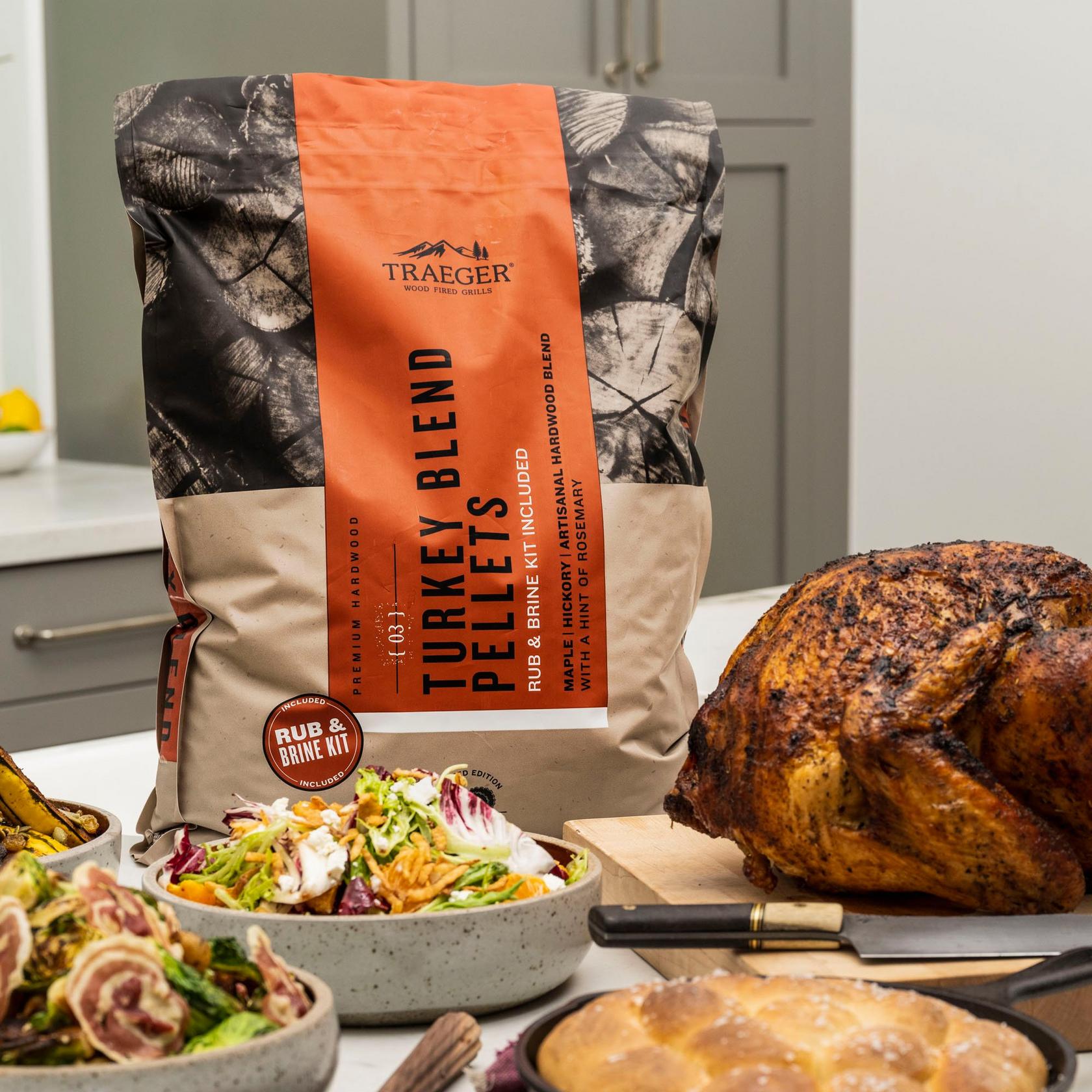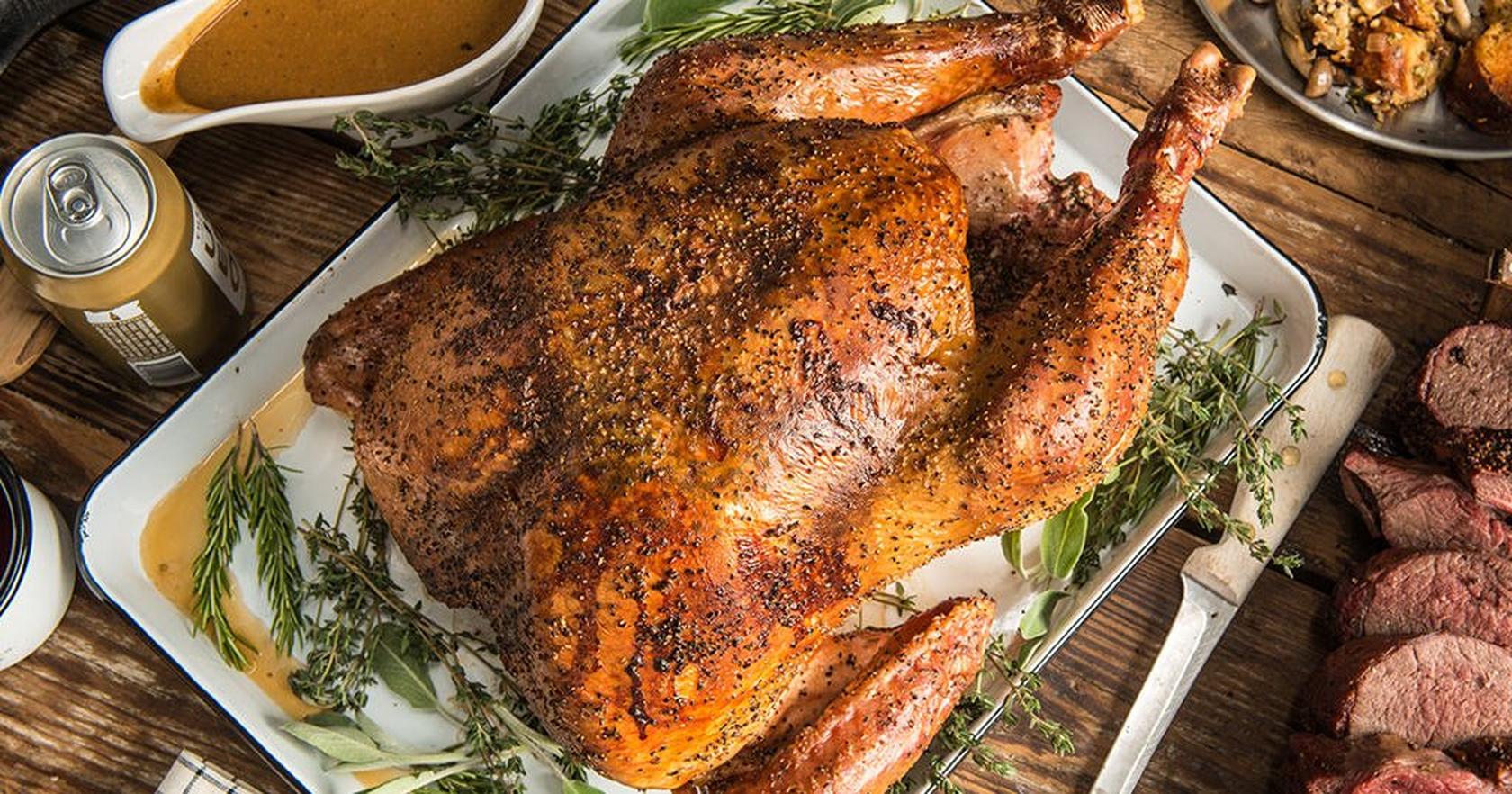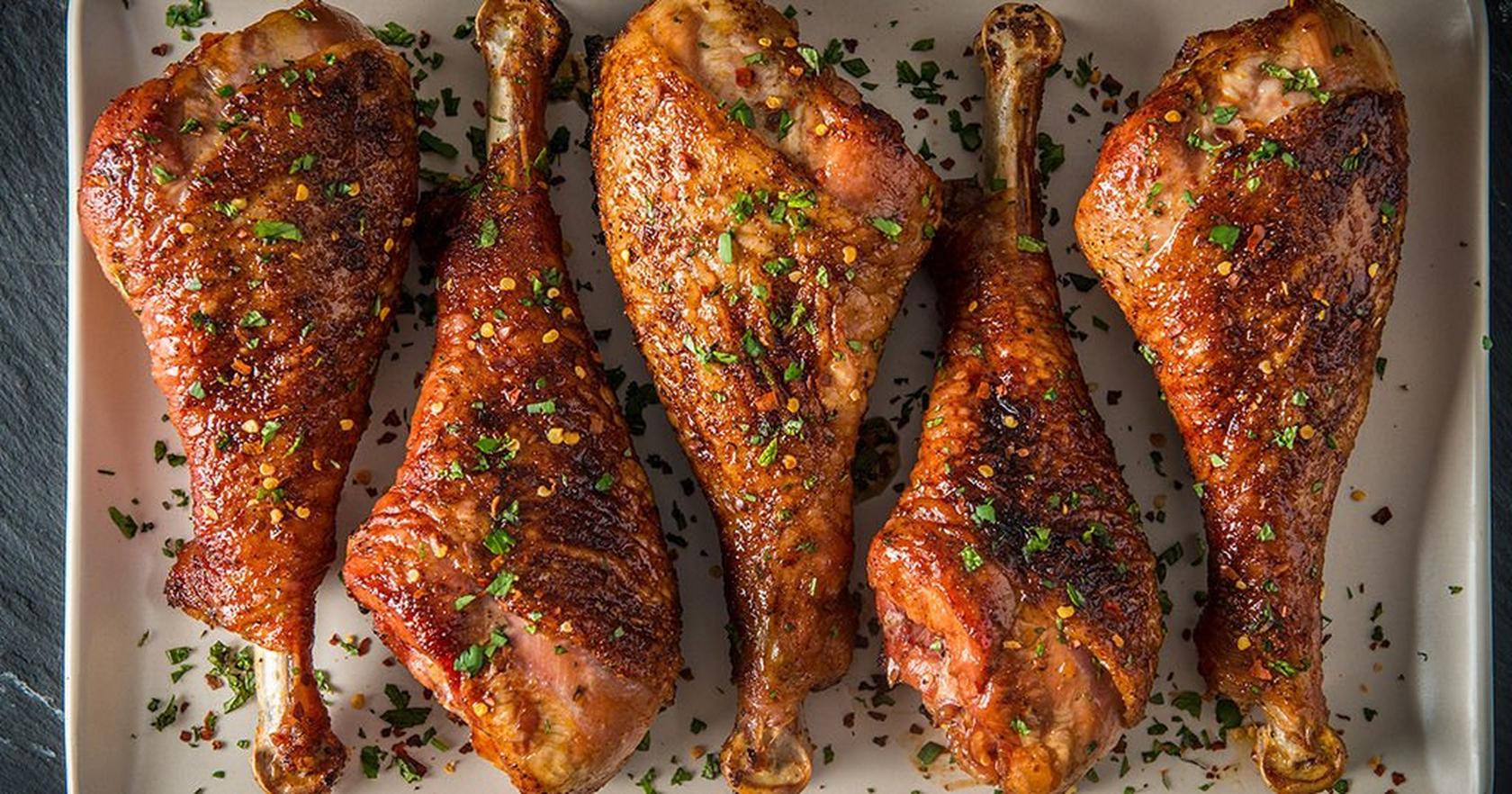
When it comes to smoking a turkey on a pellet grill, not all wood pellets are created equal. The right wood can make the difference between a turkey that’s just okay and one that leaves your guests talking for days. Whether you're after a subtle hint of sweetness or a bold kick of wood-fired flavor, finding the best pellets for smoking turkey is crucial to achieving Thanksgiving greatness.
Smoking turkey takes a more delicate touch than most other smoked meats. That’s why we’ve put together this expert pellet guide for smoking turkey: To take you through your options for hardwood pellets that will yield a delicious (but not overly smoky) turkey every time.
Choosing Pellet Flavor For Your Turkey
When you're planning on smoking a turkey, you want to make sure to get the right wood pellet flavor because each kind will give your bird a distinct wood-fired taste. Renowned pitmaster Aaron Franklin sums this up well in his award-winning book, Franklin Barbecue:
“All different woods burn slightly differently and supply unique things to any smoked food. Up in the Pacific Northwest, folks use alder planks, which contribute delicate flavor to salmon. East Texas and much of the barbecue along the Eastern Seaboard rely heavily on hickory, while great swaths of Texas favor mesquite… The long and short of it is that most people use what’s plentiful locally.”
The general rule of choosing a pellet flavor for any meat is that it should match the intensity of whatever you're cookin' up. Those heavily smoky hickory and mesquite woods are lovely with brisket, but they might overpower the delicate white meat of a turkey on their own. Instead, turn to lighter woods — or a finely tuned blend of woods, as in our number one recommendation, the Traeger Turkey Blend Wood Pellets.
Turkey Blend Pellets

Maple wood serves as the base for our Traeger Turkey Blend Pellets and provides consistent, moderate heat throughout the smoke and a delicate blend of sweet and savory flavors. A touch of hickory wood gives it just the right amount of smoke flavor to penetrate deep into the turkey breast. Taken together, these give you the best of both worlds: A delicate sweetness that pairs perfectly with turkey’s lighter meat and a dose of smoke that will keep you coming back for more.
Two more things set our Turkey Blend Pellets apart. First, they’re infused with rosemary to become a perfect pairing for turkey and stuffing. Secondly, they come with a brine kit and turkey rub — two essential steps you’ll need to take if you want your smoked turkey to come out juicy and savory rather than dry. Overall, these pellets (and their accompanying turkey brine and rub kits) are the easiest way to get a perfectly smoked turkey every single time.
Cherry Pellets
If you’re looking for an even more subtle smoked turkey flavor, fruitwoods are the way to go. They have a gentle, rounded sweetness that allows a turkey’s natural savoriness to shine through.
Our Traeger Cherry Wood Pellets are a great choice here. They’re made from a blend of hardwoods that burn long and clean, providing just a touch of fruitwood flavor that is a natural complement to ribs, beef, chicken, pork, lamb — and of course, turkey. They’re a very versatile blend, so if you’re looking to pick up one bag of pellets to test out a variety of smoked meats, choose the cherry.
Apple Pellets
Our Traeger Apple Wood Pellets are the lightest side of our range of offerings for pellet grill turkey, and they’re specifically designed to give a gentle treatment to vegetables, pork, poultry, and baked goods. Made from a blend of hardwoods and fruitwoods, they’re an all-in-one way to add the gentle sweetness of apple and just enough smoke to liven up any meat.
Compared to the cherry pellets listed above, apple pellets will provide an even more delicate flavor and about the same amount of smoke. They’re excellent for smoking a turkey and would also be a great choice for a smoked pork butt.
Pecan Pellets
For something entirely different, consider using our Traeger Pecan Wood Pellets. They’re bolder than our fruitwood blends but without the same intense smoke as hickory or mesquite.
Sweet, spicy, and assertive, they pair beautifully with a wide variety of turkey brines and rubs. They’ll lend a distinctive, signature flavor to anything you decide to smoke, making them another great choice for someone looking to try out a selection of smoked meats on their new Traeger Grill.
Tips For Smoking Turkey

Half the fun of learning to smoke meats is understanding exactly how each is best smoked. Experienced pitmasters have an intuitive sense of how much smoke, heat, and flavoring each cut of meat needs, and how to adjust those variables to get an amazingly savory and tender final product.
Temperatures, times, and seasoning blends will significantly affect how well a cut of smoked meat turns out, but in the case of turkey, there’s one other essential aspect: the brine. Let’s cover that before getting into other turkey smoking tips and tricks.
Brine Your Turkey First
Because of the structure of a turkey’s meat and its low fat percentage, smoking it successfully takes a different approach. That starts with a brine — a salty and highly flavorful liquid infusion that will keep your smoked turkey recipe from drying out while cooking on the smoker.
The basics of how to brine a turkey for smoking are this: A liquid, plenty of salt, and additional flavorings.
Water will do the trick for your first brine, so get two clean buckets ready. In the first one, mix a half cup of salt for each gallon of water (about two gallons is enough for a single turkey). Then add any additional flavorings, like herbs, spices, and Worcestershire sauce, and stir until the salt is dissolved. Then put your whole turkey in the empty bucket, pour the brine over it until it’s completely covered, and let it rest in the refrigerator for 24 hours.
Of course, you could cut to the chase here and use the tried-and-true brining kit included with our Turkey Blend Pellets instead. That’s a great way for beginners to get a jump start on the whole process. If you’d prefer to create your own brine though, we suggest following these steps.
If you're planning on buying a frozen bird, make sure to do your research on how to brine a frozen turkey before you get started.
Use A Turkey Rub for More Flavor
Once you’ve taken your turkey out of its brine, it’s time to pat it dry and apply a turkey rub for even more flavor. Liberally apply a spice blend rub of your choice to the outside of your turkey, and you’ll help it develop a crispier crust and even more delicious flavor.
Our Traeger Anything Rub is a great choice here. True to its name, it’s a great pairing with anything you want to add flavor to, thanks to its versatile blend of salt, pepper, garlic, and secret spices. You could also use our Pork & Poultry Rub, complete with paprika, onion, chili pepper, honey, and apple, to give your smoked turkey a more robust and distinct flavor. Other options are the Traeger Fin & Feather Rub, and the Traeger Chicken Dry Rub (not turkey, but close enough!).
Use the Right Temperature
There are two different ways to use the temperature of your smoker to get a perfectly cooked turkey: The high-to-low to low method, or the low-to-high.
In the high-to-low method, you’ll start the bird set on high heat on your smoker for 30 minutes. This will help lock in the flavor and get the skin nice and crispy before you reduce the temperature to 300 degrees for the rest of the cooking process. This method has the advantage of creating a crispier skin and infusing the Traeger smoked turkey with less smoke flavor throughout the cook.
Alternatively, you’ll start the turkey at a low temperature — about 225 degrees — to let it absorb as much smoky flavor as possible. Then when the internal temperature reaches about 100 to 110 degrees, you’ll crank the heat up to 300 degrees to finish cooking the bird.
For the best instructions though, follow your recipe instructions and take a look at our expert guide on smoking a turkey.
Monitor Your Turkey's Internal Temperature
Whatever method you choose to smoke your turkey, you’ll want to monitor its internal temperature with a meat thermometer throughout the entire smoking process.
The magic number you’re aiming for here is 165 degrees for the turkey’s internal temperature, which will ensure that it’s fully cooked, but not overcooked. And if you’re using the low-to-high method, you’ll need that internal temperature monitor to know when it reaches about 110 degrees, indicating that it’s time to crank up the heat to finish the cooking process. Use the MEATER thermometers for an easy way to monitor your turkey on Thanksgiving day.
Smoked Turkey Recipes

Now that you have all the tools you need to make an expert smoked turkey, dive into some of our recipes and discover the best pellets for smoking turkey first-hand:
Best Pellets For Turkey FAQ
And to round things out, let’s take a look at the most commonly asked questions about smoking turkey.
Which woods should you avoid for smoking turkey?
While the right brine and rub recipes can make any wood a decent pairing for smoked turkey, generally, you want to avoid the most heavily flavored woods. Mesquite is just too powerful a flavor for turkey and will often add too much smoke to the final product.
Figure out the best pellets for smoking through our guide.
How often do you add wood when smoking a turkey?
If you’re using whole woods to smoke a turkey, pitmasters recommend adding wood chips every hour or so to seal in a smoky flavor. But it's much easier if you’re using pellets on a Traeger — their precision temperature controls will let you know when it’s time to add more pellets to the hopper.
Before Thanksgiving is here, bookmark our guide on how to change and remove pellets so that you're fully prepared.
What flavor of pellets is best for smoking a turkey?
We’ve put a lot of work into making the perfect blend of hardwoods for our Traeger Turkey Blend Pellets, and we stand by them as the best pellets for smoking a turkey.
Easy Smoked Turkey Recipe For Thanksgiving
by Traeger Kitchen
96 Reviews
Prep Time
20 Min
Cook Time
6 Hr
Serves
10
Pellets
Turkey Blend
Enjoy this easy smoked turkey recipe for Thanksgiving or any special occasion. The turkey is brined in our citrus brine kit, seasoned with smoked turkey rub, and smoked at 225°F over Turkey Blend pellets until the smoked turkey breast reaches its ideal internal temperature. Expect a juicy, evenly smoked bird with real wood-fired flavor.
Ingredients
main
| 1 Whole | (18-20 lb) turkey, thawed if frozen, giblets removed |
| 1 | Traeger Orange Brine and Turkey Rub Kit |
| 1/2 Cup | Traeger Pork & Poultry Rub, divided |
| 1/2 Pound | Unsalted butter, softened |
1
The day before smoking, brine the turkey according to the Traeger Turkey Brine Kit package instructions. Remove from the brine, rinse, and pat dry.
2
Season the inside cavity with 2 tablespoons of Traeger Pork & Poultry Rub.
3
Use your hands to carefully separate the turkey skin from the meat over the breasts, creating a pocket. Spread the softened butter under the skin and over the breasts in an even layer about 1/4 inch thick. Season the outside of the turkey with the remaining Traeger Pork & Poultry Rub to create an epic turkey recipe.
4
Transfer the turkey to the refrigerator to chill for at least 1 hour.
5
Remove the turkey from the refrigerator. Truss the legs and tuck the wing tips underneath the bird. Place the turkey in a roasting pan.
6
When ready to cook, set the Traeger temperature to 225℉ and preheat with the lid closed for 15 minutes. For optimal flavor, use [Super Smoke](https://www.traeger.com/learn/super-smoke), if available.
7
Insert the [meat thermometer](https://www.traeger.com/shop/meater) into the thickest part of the turkey breast. Place the roasting pan on the grill grates. Close the lid and cook until the internal temperature reaches 100-110℉.
8
Increase the grill temperature to 350℉ and continue cooking until the internal temperature reaches 160℉, about 4 hours more. The time will vary depending on the size of your turkey, your grill, and the weather.
9
Remove the bird from the grill and let rest for at least 30 minutes before carving. (The internal temperature will continue to rise to reach a finished temperature of 165°F.) Enjoy!